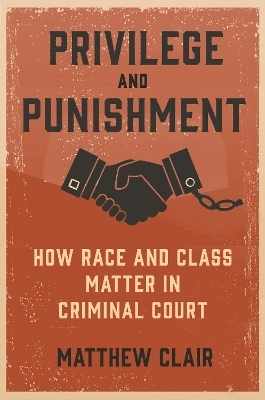
Privilege and Punishment
How Race and Class Matter in Criminal Court
Seiten
2022
Princeton University Press (Verlag)
978-0-691-23387-1 (ISBN)
Princeton University Press (Verlag)
978-0-691-23387-1 (ISBN)
How the attorney-client relationship favors the privileged in criminal court-and denies justice to the poor and to working-class people of colorThe number of Americans arrested, brought to court, and incarcerated has skyrocketed in recent decades. Criminal defendants come from all races and economic walks of life, but they experience punishment
How the attorney-client relationship favors the privileged in criminal court—and denies justice to the poor and to working-class people of color
The number of Americans arrested, brought to court, and incarcerated has skyrocketed in recent decades. Criminal defendants come from all races and economic walks of life, but they experience punishment in vastly different ways. Privilege and Punishment examines how racial and class inequalities are embedded in the attorney-client relationship, providing a devastating portrait of inequality and injustice within and beyond the criminal courts.
Matthew Clair conducted extensive fieldwork in the Boston court system, attending criminal hearings and interviewing defendants, lawyers, judges, police officers, and probation officers. In this eye-opening book, he uncovers how privilege and inequality play out in criminal court interactions. When disadvantaged defendants try to learn their legal rights and advocate for themselves, lawyers and judges often silence, coerce, and punish them. Privileged defendants, who are more likely to trust their defense attorneys, delegate authority to their lawyers, defer to judges, and are rewarded for their compliance. Clair shows how attempts to exercise legal rights often backfire on the poor and on working-class people of color, and how effective legal representation alone is no guarantee of justice.
Superbly written and powerfully argued, Privilege and Punishment draws needed attention to the injustices that are perpetuated by the attorney-client relationship in today’s criminal courts, and describes the reforms needed to correct them.
How the attorney-client relationship favors the privileged in criminal court—and denies justice to the poor and to working-class people of color
The number of Americans arrested, brought to court, and incarcerated has skyrocketed in recent decades. Criminal defendants come from all races and economic walks of life, but they experience punishment in vastly different ways. Privilege and Punishment examines how racial and class inequalities are embedded in the attorney-client relationship, providing a devastating portrait of inequality and injustice within and beyond the criminal courts.
Matthew Clair conducted extensive fieldwork in the Boston court system, attending criminal hearings and interviewing defendants, lawyers, judges, police officers, and probation officers. In this eye-opening book, he uncovers how privilege and inequality play out in criminal court interactions. When disadvantaged defendants try to learn their legal rights and advocate for themselves, lawyers and judges often silence, coerce, and punish them. Privileged defendants, who are more likely to trust their defense attorneys, delegate authority to their lawyers, defer to judges, and are rewarded for their compliance. Clair shows how attempts to exercise legal rights often backfire on the poor and on working-class people of color, and how effective legal representation alone is no guarantee of justice.
Superbly written and powerfully argued, Privilege and Punishment draws needed attention to the injustices that are perpetuated by the attorney-client relationship in today’s criminal courts, and describes the reforms needed to correct them.
Matthew Clair is assistant professor of sociology at Stanford University, where he holds a courtesy appointment at Stanford Law School. He lives in Palo Alto, California. Twitter @mathuclair
| Erscheinungsdatum | 25.05.2022 |
|---|---|
| Zusatzinfo | 14 tables. |
| Verlagsort | New Jersey |
| Sprache | englisch |
| Maße | 156 x 235 mm |
| Themenwelt | Recht / Steuern ► EU / Internationales Recht |
| Recht / Steuern ► Strafrecht ► Kriminologie | |
| Recht / Steuern ► Strafrecht ► Strafverfahrensrecht | |
| Sozialwissenschaften ► Soziologie ► Makrosoziologie | |
| ISBN-10 | 0-691-23387-X / 069123387X |
| ISBN-13 | 978-0-691-23387-1 / 9780691233871 |
| Zustand | Neuware |
| Informationen gemäß Produktsicherheitsverordnung (GPSR) | |
| Haben Sie eine Frage zum Produkt? |
Mehr entdecken
aus dem Bereich
aus dem Bereich
klare Antworten aus erster Hand
Buch | Softcover (2023)
UTB (Verlag)
19,90 €


